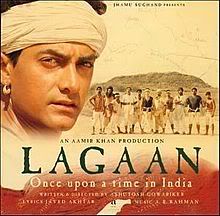By: inoljt, http://mypolitikal.com/
I recently had the pleasure of watching my first Bollywood movie, a title called Lagaan: Once upon a time in India. The movie’s plot was fairly conventional yet unconventional at the same time. India is straining under the rule of the evil British Empire. A rebellious young man with striking green eyes attempts to defy the British. How? By beating them in a cricket match! The local village quickly forms a cricket team, the British team is defeated, and the local village’s crushing tax burden is reduced for the next several years.
There were some fairly interesting things about this movie (with respect to politics).
More below.
The movie, for all its dislike of the evil British Empire, still seemed to have some yearning that the British respect India. Perhaps the most obvious example of this occurred when the main British generals praised the skill of the Indian cricket team.
The movie also had a strong message about equality of castes, an issue that continues to plague India. The main character adds an untouchable onto his team for the untouchable’s skill at throwing the ball, despite the very strong resistance of the rest of the team. Unfortunately, the untouchable (Kachra) didn’t seem to play that well. Somehow, despite his skill at throwing the ball the British were able to always hit it; also at the end of the movie, he apparently failed to hit the ball when a lot was riding on his ability to do so. (A note of caution: apparently Wikipedia says that he was more of a service to the team than my recollection of the movie).
In any case, it seemed that despite the movie’s vocal advocacy of equality of castes, the person of lowest caste was still treated somewhat poorly. This is especially true given that an upper-caste person advocates for Kachra; why didn’t the untouchable advocate for himself? Or why wasn’t Kachra a main character rather than a mere side character? One guesses that having an untouchable as a protagonist in a Bollywood movie would be like having an Asian as a protagonist in a Hollywood movie; unheard of!
It was also interesting to see the United Kingdom portrayed as the bad guys. Most Americans are used to seeing the British as those tea-drinking people with funny accents. A lot of the scenes in which the British generals abuse the Indian farmers in Lagaan are not meant to be humorous. But for me, at least, (with the influence of American culture) it was sometimes hard to fully square the fact that British people with their funny accents could be evil. I say this with lightheartedness, but it does reflect the strength of American perceptions of the United Kingdom.
Nevertheless, there was one fact that did bother me: seeing the British flag fly over places where it definitely should not have been flying. To see a battalion of soldiers march into an Indian village, proudly flying the British flag, was quite disconcerting. So was seeing a British general with no knowledge of India talk proudly of India being Britain’s. What in the world was Great Britain doing there? How did what was happening in India have anything to do with Great Britain? To have the British flag over so many places where it had no business being seemed quite unnatural. It brought home the fact that Great Britain should not have ruled over so many peoples that it had no connection to nor empathy with.

2 comments